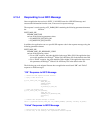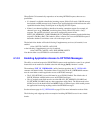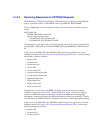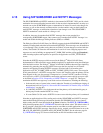4.14.5 Receiving OPTIONS Requests
When the Dialogic
®
Global Call API library is started with the
IP_VIRTBOARD.E_SIP_OPTIONS_Access field set to ENUM_Enabled (to allow application
access to OPTIONS requests), the library will act in one of two ways when the SIP stack receives a
SIP OPTIONS request:
• If there is no channel available to handle an incoming connection request (for example, all
channels in use or gc_WaitCall( ) not having been called), Global Call automatically sends a
“busy” response. The application can set the specific code that is sent by means of the
IPSET_SIP_RESPONSE_CODE/ IPPARM_BUSY_REASON parameter, but the default busy
response is 486 Busy Here. The behavior of sending a busy response allows a remote UA to
use an OPTIONS request to determine whether it can initiate a new call on the target system.
• If there is a channel available to handle incoming calls, the library generates an Extension
event (GCEV_EXTENSION) of type IPEXTID_RECEIVEMSG to notify the application of
the incoming OPTIONS request. The GC_PARM_BLK associated with the Extension event
will contain a parameter element with the IPSET_MSG_SIP set ID, the IPPARM_MSGTYPE
parameter ID, and the value IP_MSGTYPE_SIP_OPTIONS.
The application can use the techniques described in Section 4.9.6, “Retrieving SIP Message Header
Fields” to retrieve header fields of interest, including:
• To header field
• Request URI
• From header field
• Contact URI
• Accept header field
• Accept-encoding header field
• Accept-language header field
• Supported header field
• Allow header field
• Require header field
• Call-ID header field
The application can also extract MIME information from the message body using the techniques
described in Section 4.10.3, “Getting MIME Information”, on page 191. Note that the MIME part
that contains SDP information is not exposed to the application.
The application must retrieve the necessary SIP message header and body information by copying
the data into its own buffer before the next call to gc_GetMetaEvent( ). Once the next
gc_GetMetaEvent( ) call is issued, the message information is no longer available from the
metaevent buffer.
The following pseudo-code illustrates how to extract an OPTIONS request from a received
GCEV_EXTENSION event,


















